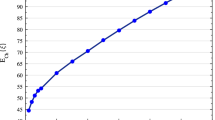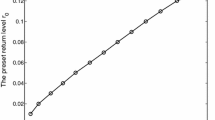Abstract
Portfolio selection is concerned with selecting an optimal portfolio that can strike a balance between maximizing the return and minimizing the risk among a large number of securities. Traditionally, security returns were regarded as random variables. However, there are cases that the predictions of security returns are given mainly based on experts’ judgements and estimations rather than historical data. In this paper, we introduce a new type of variable to reflect the subjective estimations of the security returns. A risk index for uncertain portfolio selection is proposed and a new safe criterion for judging the portfolio investment is introduced. Based on the proposed risk index, a new mean-risk index model is developed and its crisp forms are given. In addition, to illustrate the application of the model, two numerical examples are also presented.
Similar content being viewed by others
References
Abdelaziz F. B., Aouni B., Fayedh R. E. (2007) Multi-objective stochastic programming for portfolio selection. European Journal of Operational Research 177: 1811–1823
Bilbao-Terol A., Pérez-Gladish B., Arenas-Parra M., Rodríguez-Uría V. R. U. (2006) Fuzzy compromise programming for portfolio selection. Applied Mathematics and Computation 173: 251–264
Carlsson C., Fullér R., Majlender P. (2002) A possibilistic approach to selecting portfolios with highest utility score. Fuzzy Sets and Systems 131: 13–21
Chen X. W., Liu B. (2010) Existence and uniqueness theorem for uncertain differential equations. Fuzzy Optimization and Decision Making 9: 69–81
Corazza M., Favaretto D. (2007) On the existence of solutions to the quadratic mixed-integer mean-variance portfolio selection problem. European Journal of Operational Research 176: 1947–1960
Gao X. (2009) Some properties of continuous uncertain measure. International Journal of Uncertainty, Fuzziness and Knowledge-Based Systems 17: 419–426
Gao X., Gao Y., Ralescu D. A. (2010) On Liu’s inference rule for uncertain systems. International Journal of Uncertainty, Fuzziness and Knowledge-Based Systems 18: 1–11
Huang X. (2007) Portfolio selection with fuzzy returns. Journal of Intelligent & Fuzzy Systems 18: 383–390
Huang X. (2008) Mean-semivariance models for fuzzy portfolio selection. Journal of Computational and Applied Mathematics 217: 1–8
Huang X. (2008) Portfolio selection with a new definition of risk. European Journal of Operational Research 186: 351–357
Huang X. (2011) Mean-risk model for uncertain portfolio selection. Fuzzy Optimization and Decision Making 10: 71–89
Huang X. (2012) Mean-variance models for portfolio selection subject to experts’ estimations. Expert Systems with Applications 39: 5887–5893
Lacagnina V., Pecorella A. (2006) A stochastic soft constraints fuzzy model for a portfolio selection problem. Fuzzy Sets and Systems 157: 1317–1327
Li X., Qin Z., Kar S. (2010) Mean-variance-skewness model for portfolio selection with fuzzy returns. European Journal of Operational Research 202: 239C247
Lin C. C., Liu Y. T. (2008) Genetic algorithm for portfolio selection problems with minimum transaction lots. European Journal of Operational Research 185: 393–404
Liu B. (2007) Uncertainty theory (2nd ed.). Springer, Berlin
Liu B. (2009) Theory and practice of uncertain programming (2nd ed.). Springer, Berlin
Liu B. (2010) Uncertainty theory: a branch of mathematics for modeling human uncertainty. Springer, Berlin
Markowitz H. (1952) Portfolio selection. Journal of Finance 7: 77–91
Peng Z. X., Iwamura K. (2010) A sufficient and necessary condition of uncertainty distribution. Journal of Interdisciplinary Mathematics 13: 277–285
Qin Z., Li X., Ji X. (2009) Portfolio selection based on fuzzy cross-entropy. Journal of Computational and Applied Mathematics 228: 139–149
Tanaka H., Guo P. (1999) Portfolio selection based on upper and lower exponential possibility distributions. European Journal of Operational Research 114: 115–126
Watada J. (1997) Fuzzy portfolio selection and its applications to decision making. Tatra Mountains Mathematical Publication 13: 219–248
You C. (2009) Some convergence theorems of uncertain sequences. Mathematical and Computer Modelling 49: 482–487
Zhang X., Zhang W. G., Cai R. (2010) Portfolio adjusting optimization under credibility measures. Journal of Computational and Applied Mathematics 234: 1458–1465
Zhu Y. (2010) Uncertain optimal control with application to a portfolio selection model. Cybernetics and Systems 41: 535–547
Author information
Authors and Affiliations
Corresponding author
Rights and permissions
About this article
Cite this article
Huang, X. A risk index model for portfolio selection with returns subject to experts’ estimations. Fuzzy Optim Decis Making 11, 451–463 (2012). https://doi.org/10.1007/s10700-012-9125-x
Published:
Issue Date:
DOI: https://doi.org/10.1007/s10700-012-9125-x




